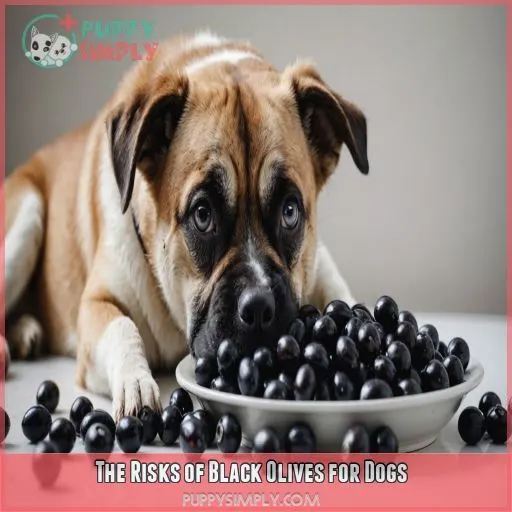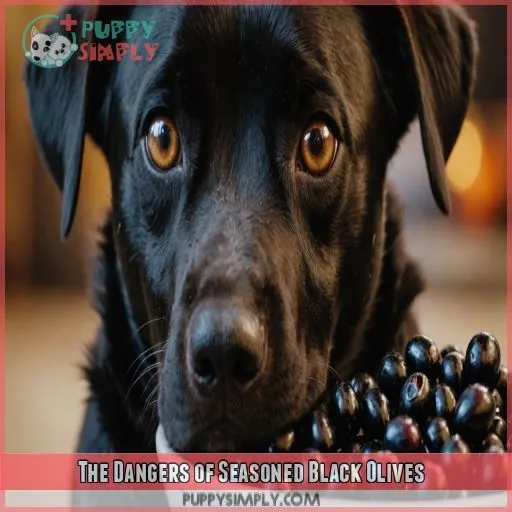This site is supported by our readers. We may earn a commission, at no cost to you, if you purchase through links.
 Yes, dogs can eat black olives, but they’re not essential to their diet.
Yes, dogs can eat black olives, but they’re not essential to their diet.
Plain, unsalted black olives are a healthy treat for dogs, but moderation is key.
The pit is a choking hazard, and canned or pickled olives are loaded with sodium.
To learn more about feeding your dog olives safely and explore other snack options, keep reading.
Table Of Contents
- Key Takeaways
- Are Black Olives Safe for Dogs?
- The Risks of Black Olives for Dogs
- How Many Black Olives Can Dogs Eat?
- The Dangers of Seasoned Black Olives
- Can Dogs Eat Olive Oil?
- Safe Alternatives to Black Olives for Dogs
- Frequently Asked Questions (FAQs)
- Are black olives okay for dogs to eat?
- Can dogs eat olives with pimento?
- Are black olive trees safe for dogs?
- Can dogs eat olives and capers?
- What are the symptoms of salt toxicity in dogs?
- Can dogs eat raw olives?
- Are there any health benefits to feeding dogs olive oil?
- How much olive oil is too much for dogs?
- Are there any alternatives to olive oil for dogs?
- Conclusion
Key Takeaways
- Black olives are not toxic to dogs, but they’re not a necessary part of their diet either. While plain, unsalted olives can be a healthy treat, they can also add unnecessary calories.
- Olive pits are a serious choking hazard for dogs and can even crack their teeth. Always remove pits before sharing olives with your pup.
- Canned and pickled olives are loaded with sodium, which can lead to dehydration and salt toxicity in dogs. Stick to unsalted or reduced-salt options and offer them sparingly.
- Seasoned black olives often contain ingredients that are toxic to dogs, such as garlic and onions. Always check the ingredients before feeding olives to your dog, and stick to plain, unsalted varieties.
Are Black Olives Safe for Dogs?
You might be wondering if your furry friend can join in on your olive-snacking sessions. Well, plain black olives aren’t toxic to dogs, but there are some things you should know before sharing this treat with your pup.
Let’s get into the details and find out if black olives are truly safe for your dog to eat and whether they offer any health benefits.
Olives Are Not Toxic to Dogs
Are Black Olives Safe for Dogs?"
Olives aren’t toxic to dogs, so you don’t need to panic if your furry friend sneaks a bite. But, before you start sharing your snacks, there are a few things you should know.
Plain, Unsalted Olives Are a Healthy Snack
While olives aren’t toxic to dogs and can be a healthy snack, they’re not a necessary part of their diet.
Plain, unsalted olives provide healthy fats and proteins, but they can also add unnecessary calories.
If you’re feeding your dog a balanced diet, they won’t need those extra nutrients.
Olive Pits Are a Choking Hazard
While plain, unsalted olives are a healthy treat for your dog, olive pits are a different story. These pits can be a serious choking hazard for your furry friend, blocking their airways or getting lodged in their intestinal tract. Not to mention, the hard pits can even crack your dog’s teeth.
Avoid Canned and Pickled Olives
Canned and pickled olives are a no-go for your furry friend.
Why? Well, these little suckers are often brimming with sodium, thanks to their cozy bath in brine.
And we all know too much sodium can mess with your dog’s health, leading to dehydration and even toxicity.
The Risks of Black Olives for Dogs
While black olives aren’t toxic to dogs, they do come with some risks. The biggest concern is their high sodium content, which can lead to dehydration and, in extreme cases, salt toxicity.
High Sodium Content Can Lead to Dehydration
While plain black olives are safe for dogs, they’re often cured in brine, making them high in sodium. Excess sodium can lead to dehydration and other health issues in dogs. Always opt for unsalted or reduced-salt options. Remember, too many treats can add unnecessary calories to your dog’s diet, so keep portions small and infrequent.
Salt Toxicity is Possible With Excessive Consumption
While black olives aren’t toxic to dogs, their high sodium content can lead to salt toxicity if consumed in large quantities. This can cause vomiting, lethargy, and seizures. It’s important to monitor your dog’s olive intake and opt for low-sodium options.
How Many Black Olives Can Dogs Eat?
So, how many black olives can your pup safely enjoy? Well, the general rule of thumb is to limit their intake to one or two olives in a 24-hour period.
One or Two Olives in 24 Hours is Sufficient
You might be wondering, "How many black olives can my dog safely eat?" Well, the answer is simple: one or two olives in a 24-hour period is more than enough for your furry friend. This may seem like a small amount, but remember, olives are meant to be an occasional treat and not a regular part of your dog’s diet.
Here are some key points to keep in mind:
- Moderation is key: Olives should be a rare treat, not a daily snack.
- Size matters: Smaller dogs may only need half an olive, while larger dogs can handle one or two.
- Vet knows best: Always consult your veterinarian for personalized advice about your dog’s diet and treat options.
Cut Olives Into Small Pieces to Minimize Choking Hazards
When feeding your dog olives, it’s important to cut them into small pieces to minimize choking hazards.
One or two olives in a 24-hour period is enough for your furry friend.
Remember to always remove the pits first, as they can pose a serious choking risk and damage your dog’s teeth.
Keep an eye out for any signs of allergies or intolerances, such as itchy skin or tummy troubles, though olive allergies are rare in dogs.
Monitor for Signs of Allergies or Intolerances
While olive allergies in dogs are rare, keep an eye out for any skin reactions or digestive issues after they’ve munched on an olive or two. Itchy skin and gastric upsets are red flags that your pup might be intolerant to olives. If you notice any signs of an allergic reaction, call your vet ASAP.
The Dangers of Seasoned Black Olives
While plain black olives are safe for dogs to eat in moderation, seasoned black olives can be dangerous. You should be aware of the potential risks of feeding your dog seasoned olives, as some common ingredients can be toxic to our furry friends.
Garlic and Onions Are Toxic to Dogs
N/A
Avoid Stuffed or Marinated Black Olives
While plain black olives are safe for dogs, it’s important to steer clear of stuffed or marinated olives. These seasoned olives often contain a mix of ingredients that can be harmful to your furry friend. You don’t want your pooch munching on garlic or onions, which are common additives in stuffed olives and toxic to dogs.
Always opt for plain, unsalted black olives if you’re offering your dog this treat. It’s better to be safe than sorry!
Check Ingredients Before Feeding Olives to Dogs
Be careful with seasoned black olives. Before giving your dog any olives, check the ingredients. Here’s why:
- Toxic additives: Olives are often coated with garlic, seasonings, or oils, which can be harmful to dogs.
- Garlic in olives: Garlic is a common additive and is toxic to our canine friends.
- Stuffed olives: Avoid stuffed olives as they may contain ingredients like blue cheese, which is particularly toxic to dogs and requires immediate veterinary attention if ingested.
- Onions and peppers: Onions and jalapeno peppers are also toxic to dogs and may be used as additives in seasoned olives.
- Safe snacks: Stick to plain, unsalted olives as a healthy treat option for your dog.
Can Dogs Eat Olive Oil?
So, can dogs eat olive oil? Yes, they can. But should they? Let’s find out.
Olive Oil is Not Toxic to Dogs
You might be wondering, can dogs eat olive oil? Well, it’s a relief to know that olive oil isn’t toxic to dogs. It’s sometimes even found in dog food and treats. But, as with most things, moderation is key. While olive oil can provide some benefits, overdoing it can lead to health issues like pancreatitis.
| Keyword | Subtopic |
|---|---|
| Olive oil benefits | Dog coat health |
| Olive oil dosage | Pancreatitis risk |
Benefits of Olive Oil for Skin and Coat Health
Olive oil isn’t just for your salad anymore! It turns out that olive oil can be beneficial for your dog’s skin and coat health, too. Here are three ways olive oil can help:
- Moisturizes Dry Skin: Olive oil is packed with healthy fats and antioxidants, making it an excellent natural moisturizer for your dog’s skin. No more itchy, flaky skin for your furry friend!
- Promotes a Shiny Coat: The omega-3 fatty acids in olive oil help nourish your dog’s coat, making it soft, shiny, and healthy-looking. Say goodbye to dull, brittle fur.
- Supports Overall Health: Olive oil is a good source of vitamins E and K, which are essential for your dog’s overall health. Vitamin E boosts their immune system, while vitamin K supports healthy blood clotting and strong bones.
Consume in Moderation to Avoid Pancreatitis
While olive oil isn’t toxic to dogs, too much can lead to problems. It’s rich in fat, so overconsumption can cause pancreatitis—an inflammation of the pancreas leading to vomiting, abdominal pain, and organ failure in severe cases.
Moderation is key. A drizzle on their food now and then provides a healthy boost of fats and antioxidants. Don’t overdo it, though. Consult your vet if unsure.
Safe Alternatives to Black Olives for Dogs
So, what can you give your pup if olives aren’t their thing? Or maybe you’re just looking for some healthier alternatives to mix things up.
There are plenty of fresh fruits and veggies that make for nutritious doggie snacks.
Fresh Fruits and Vegetables as Healthy Snacks
If you’re looking for healthier treats for your pup, there are plenty of fruits and veggies that fit the bill. Apples, bananas, blackberries, blueberries, cantaloupe, and watermelon are all safe bets. Your dog might also enjoy chomping on carrots, cauliflower, green beans, or sweet potato.
Introduce New Foods in Moderation
When introducing new foods to your dog’s diet, always do so in moderation. Start with small amounts and gradually increase them over time. Monitor your dog closely for any signs of digestive upset or allergic reactions, such as itchy skin, gastric upsets, or changes in behaviour. Remember, the majority of your dog’s diet should come from a well-balanced dog food.
Consult a Veterinarian for Diet Advice
When in doubt, it’s always best to consult your veterinarian for advice specific to your dog’s diet. They can provide guidance on safe and nutritious treats. Here are some safe alternatives to black olives for your dog:
- Apples
- Bananas
- Bell peppers
- Blackberries
Frequently Asked Questions (FAQs)
Are black olives okay for dogs to eat?
Plain black olives aren’t toxic to dogs, but they’re not a necessary part of their diet. They’re high in sodium, so feed your dog sparingly, and always remove pits, which are a choking hazard.
Can dogs eat olives with pimento?
Your dog can eat pimento-stuffed olives, but only if pimentos are the only added ingredient. Avoid garlic, onions, and blue cheese-stuffed olives as they’re toxic to dogs.
Are black olive trees safe for dogs?
Black olive trees aren’t toxic to dogs, but they can cause vomiting and diarrhea. Keep an eye out for these symptoms and consult a vet if your dog shows any signs of distress.
Can dogs eat olives and capers?
Yes, dogs can eat plain, pitted, and unsalted olives in moderation. But, no, they shouldn’t eat capers – they’re too salty.
What are the symptoms of salt toxicity in dogs?
Watch out for vomiting, diarrhoea, lethargy, tremors, seizures, coma, and death. Other signs include increased heart rate, respiratory distress, and walking like they’re drunk.
Can dogs eat raw olives?
Dogs can eat raw olives, but only in moderation. Raw olives aren’t toxic to dogs, but their high sodium and fat content means they shouldn’t eat them regularly.
Are there any health benefits to feeding dogs olive oil?
Olive oil has many health benefits for dogs. It can improve skin and coat health, aid digestion, and provide essential nutrients. It may also improve focus and attention, especially for intelligent breeds.
How much olive oil is too much for dogs?
You might be wondering how much olive oil is too much for your furry friend. Well, while olive oil isn’t toxic to dogs, too much can cause pancreatitis. Always consult your vet before adding anything new to your dog’s diet.
Are there any alternatives to olive oil for dogs?
Coconut oil and fish oil are great alternatives to olive oil. They offer an array of health benefits for your pooch, too.
Conclusion
So, can dogs eat black olives? Absolutely, but only the plain, unsalted variety, and always in moderation. While they’re not toxic, the pits and high sodium content in canned or pickled olives pose risks. Opt for safer alternatives like fresh fruits and veggies, and always consult your vet if you’re unsure.












